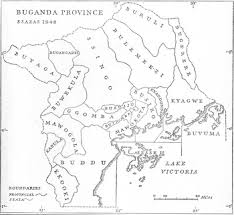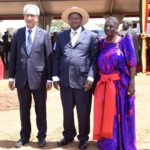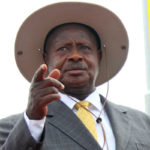During the early independence times, Milton Obote and the Buganda Kingdom were on good terms politically. Together they ensured that Obote, not Benedicto Kiwanuka, became the Executive Prime Minister of Uganda. Obote’s small Cabinet had a sizeable number of Ministers from the Kingdom of Buganda, made easy by the political association of UPC and Kabaka Yekka.
The Ministers included Luyimbazi Zake, Sempa, Lumu and Kalule Ssettala. Hell, however, broke loose when Obote ignored the friendship that enabled him to assume power and subjected the decision of returning the Lost Counties of Bunyoro -Buyaga and Bugangaizi to Bunyoro through a referendum in the Lost Counties. The referendum favoured Bunyoro Kingdom, not Buganda Kingdom, when the occupants of Buyaga and Bugangaizi voted to belong to Bunyoro Kingdom. Buganda’s national heart towards Obote changed for the worse drastically. It was no longer going to be an easy political relationship between Obote and Buganda.
At the worst of their relationship Buganda angrily ordered, through the word of mouth of the then Katikiro of Buganda, Joash Mayanja-Nkangi, Obote to remove his Government from the soil of Buganda. However, it was like biblical David declaring war on biblical Goliath. A clash between Buganda and Obote’s instruments of coercion was inevitable. Blood flowed, the Kabaka of Buganda, Sir Edward Muteesa II fled to exile, and ultimately Obote abolished the Buganda Kingdom, alongside the Kingdoms of Ankole, Bunyoro and Toro and the semi-federal State of Busoga. That was a bad ending to a crucial political friendship.
Buganda never forgave Obote. She celebrated and ululated when Idi Amin overthrew Obote in 1971. That was undoubtedly expected, given the frosty relationship between Obote and Buganda. Amin’s earliest Cabinet had many sons of Buganda. Indeed, without Buganda’s solid support, Amin’s regime would have collapsed in the first few months of its existence. Explicitly, the real enemy of Buganda was perceived by the majority of the Baganda to be Obote. Even when they have suffered under the reign of Tibuhaburwa Museveni many Baganda have hitherto not considered him as much of an enemy as Obote was or is even in death.
Beyond Amin, one person Buganda did not want to see ruling Uganda again from her soil was Obote. Although the Kingdom had connived with Obote to deny catholic Benedicto Kiwanuka post-independence premiership, in 1980 it fielded behind Catholic Paul Ssemogerere’s Democratic Party to ensure the ballot paper denied Obote becoming President again and ruling from Buganda soil.
Ssemogerere did not succeed in flooring Obote and his UPC in the elections presided over by the Military Commission of the Uganda National Liberation Front (UNLF) even if the whole of Buganda was solidly behind him. When Ssemogerere cried foul, the second most powerful person in the Military Commission, which was led by strongman Paul Muwanga, took advantage and made himself the most forthright military crusader for electoral justice when he launched a rebellion against the Obote regime without first resigning from the Uganda National Liberation Army, whose Ministry of Defense he was the legitimate political head of. This crusader was Yoweri Tibuhaburwa Museveni. His crusade was helped by Baganda exiles in Kenya, led by former President Yusuf Lule, who in 1981 formed the National Resistance Movement (NRM) and its military wing, National Resistance Army (NRA), and invited him (Museveni) to be its Commander. It has never been different since.
Tibuhaburwa has remained commander in Chief and is these days commanding his army against Ugandans in general and Uganda in particular. Baganda got recruited en masse into the NRA and also perished en masse in the bushes of Luwero Triangle. Nevertheless the mission of removing Obote’s regime from power was realized when the Okellos overthrew the man from power, but the Okellos were subsequently also removed from power by the NRM/NRA on January 25th 1986, the very date in 1971 when Amin removed Obote’s first regime from power.Tibuhaburwa Museveni has never let go since then and has used elections since 1996 to legitimise a military adhesion to power. However, since 1996 the blood of Buganda has continued to flow despite the fact that they helped to affirm the NRM/NRA in power.
This is unfortunate. Even during the recent Presidential campaigns the majority of those who died were from Buganda. The Kingdom of Buganda, which the people of Buganda were told had been restored, remains a miniscule of its former self and glory since it was deprived of all political powers that were concentrated in one man constitutionally. The one man is using it effectively to exclude Ugandans from power by hook or crook.
The question is: did Buganda choose to use the 2021 Presidential and Parliamentary elections to express her despair, dissatisfaction and anger with the NRM/NRA (NRM/UPDF)?
Through the peaceful means of the ballot paper, Buganda seems to have succeeded in almost expelling NRM and NRA from effectively dominating her socio-political spectrum. There was almost no UPC in Buganda between 1962 and 1971, save for people like Samwiri Mugwisa and Paulo Muwanga, and the 2021 Presidential and Parliamentary elections of 14 January have reenacted that period: No big NRM people in Parliament anymore, thanks to Kyagulanyi’s decision to form a political party at a critical time and successfully sell it to Buganda. The tortures and killings of Buganda by army and police during the Presidential elections helped to unite Baganda under Kyagulanyi’s National Unity Platform, which also captivated many other Ugandans in the whole country. We shall soon know what went wrong in other parts of Uganda or during the elections to deny Kyagulanyi victory.
Are we beginning to see NRM/NRA decline in Buganda? It seems Buganda has chosen the National Unity Platform, led by strong, immensely popular Muganda, over NRM/NRA led by Tibuhaburwa Museveni. Well, time will tell. Tibuhaburwa Museveni has the money, jobs and political resources and the power of incumbency, which he can deploy to reverse the process of rejection by Buganda.
Whether we like it or not Buganda will remain a political force to reckon with in the politics of Uganda if she can meaningfully and effectively deploy it at the centre. Already Buganda, by virtue of the recently concluded elections, has become the greatest producer of Opposition members in the forthcoming Parliament. That must be a huge twist in the politics of Uganda. It means Buganda has become the leading regional force against NRM/A hegemony at the national level and at the centre of power: Kampala. If you say No then you are just being insensitive to the direction National Politics is taking: Wholesome Central Rejection of NRM/A hegemony. This is true even in Luwero, where NRM/A reigned its military exploits that catapulted it into power at the Centre. What can it mean if Opposition National Unity Platform takes almost all the Parliamentary seats in the area?
My thinking is that Buganda has accepted that if she led in bringing NRM/A into power militarily, she is the one that must lead in the determination to throw it out of power in Uganda. So far Buganda has succeeded in casting NRM/A as an occupation politico-military outfit. This is despite the fact that President Museveni has pumped trillions of taxpayers’ money to buy political party and himself. Even when Covid 19 struck President Museveni pumped billions in form of food, especially Wakiso and Kampala Districts, but the political effect has been negative for the President and his Party. It is clear Buganda wants change.
We can still ask: Is NRM/NRA really rolling out of Buganda? Is it true the people where President Museveni and his Party scooped enormous electoral success stories (in the periphery) don’t want change?
Well, if elections are what are left for Ugandans to use to communicate changing political attitudes as far as Kampala, Wakiso, and indeed the whole of Buganda, where most atrocities of the NRM/A have occurred over the years, then Ugandans have spoken, despite being harangued militarily. NRM/A is now like a small isolated island in the centre of an ocean of turbulent waters. It can only take refuge in the periphery to lengthen its stay in power politically; not militarily. But is the collective leadership of the NRM/A, so deeply wounded by the Presidential and Parliamentary elections, critically reflecting on what the elections results at the centre mean, if we are to take the results in the periphery as reflecting the current true collective political attitude of the people there?
Time for critical analysis has started, now that the INTERNET has been freed by the powers that be. It means our minds have also been freed.
“The Changing Political Attitudes in Uganda” is a reality, not fiction. What we see, however, could mean success of the NRM/A in the politico-military strategy of disconnecting the periphery from the centre for the purposes of power retention as long as it can.
For God and My Country
Oweyagha Afunaduula








